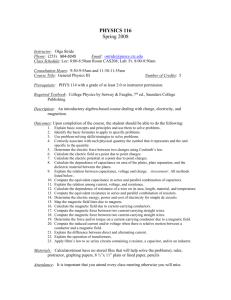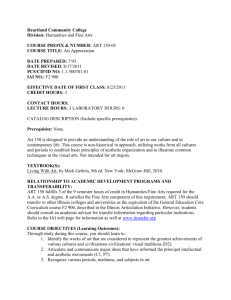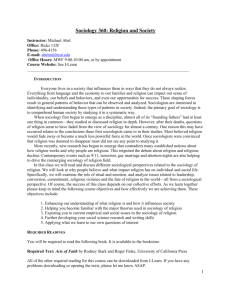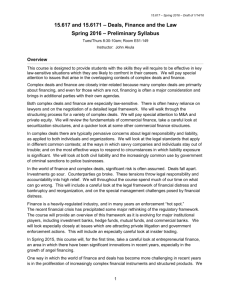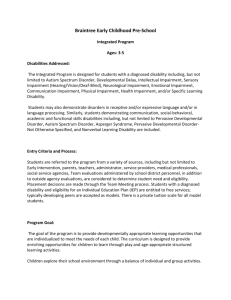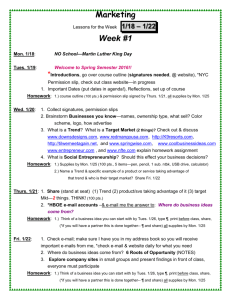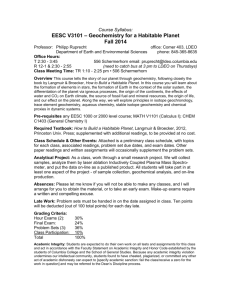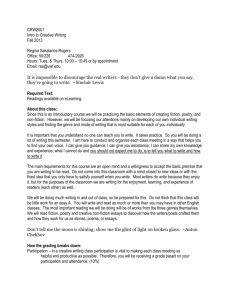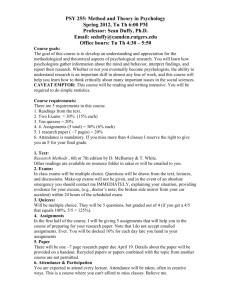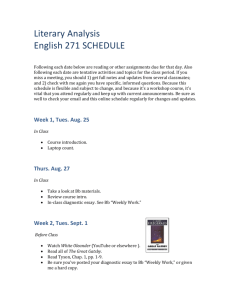The Beloved Community in American
advertisement
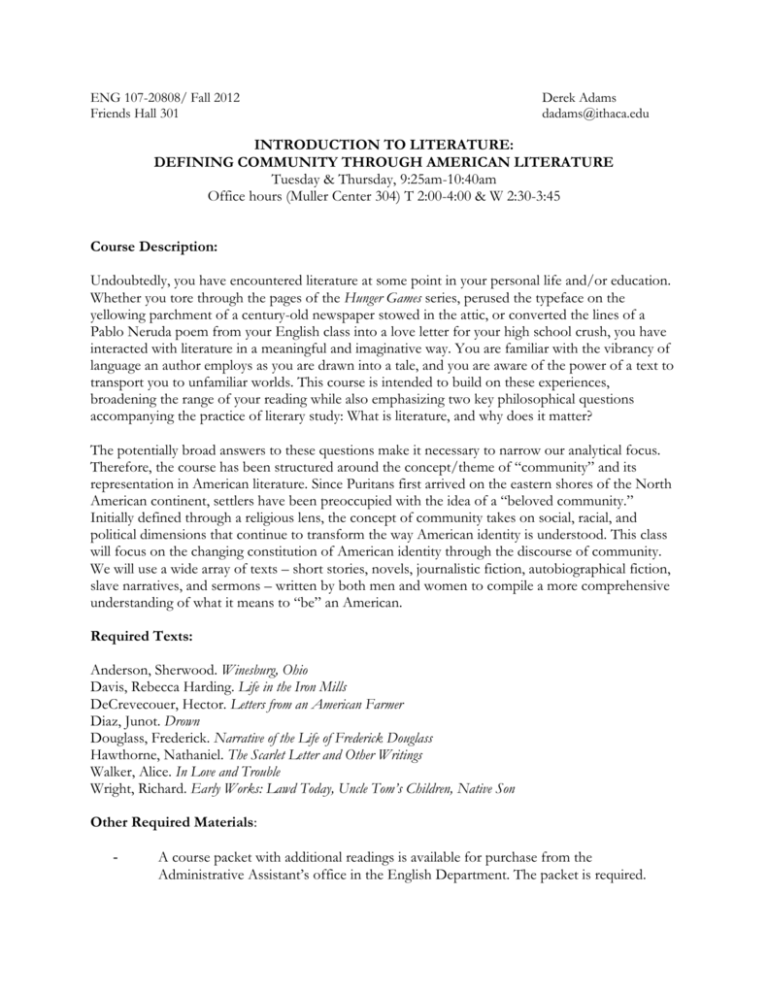
ENG 107-20808/ Fall 2012 Friends Hall 301 Derek Adams dadams@ithaca.edu INTRODUCTION TO LITERATURE: DEFINING COMMUNITY THROUGH AMERICAN LITERATURE Tuesday & Thursday, 9:25am-10:40am Office hours (Muller Center 304) T 2:00-4:00 & W 2:30-3:45 Course Description: Undoubtedly, you have encountered literature at some point in your personal life and/or education. Whether you tore through the pages of the Hunger Games series, perused the typeface on the yellowing parchment of a century-old newspaper stowed in the attic, or converted the lines of a Pablo Neruda poem from your English class into a love letter for your high school crush, you have interacted with literature in a meaningful and imaginative way. You are familiar with the vibrancy of language an author employs as you are drawn into a tale, and you are aware of the power of a text to transport you to unfamiliar worlds. This course is intended to build on these experiences, broadening the range of your reading while also emphasizing two key philosophical questions accompanying the practice of literary study: What is literature, and why does it matter? The potentially broad answers to these questions make it necessary to narrow our analytical focus. Therefore, the course has been structured around the concept/theme of “community” and its representation in American literature. Since Puritans first arrived on the eastern shores of the North American continent, settlers have been preoccupied with the idea of a “beloved community.” Initially defined through a religious lens, the concept of community takes on social, racial, and political dimensions that continue to transform the way American identity is understood. This class will focus on the changing constitution of American identity through the discourse of community. We will use a wide array of texts – short stories, novels, journalistic fiction, autobiographical fiction, slave narratives, and sermons – written by both men and women to compile a more comprehensive understanding of what it means to “be” an American. Required Texts: Anderson, Sherwood. Winesburg, Ohio Davis, Rebecca Harding. Life in the Iron Mills DeCrevecouer, Hector. Letters from an American Farmer Diaz, Junot. Drown Douglass, Frederick. Narrative of the Life of Frederick Douglass Hawthorne, Nathaniel. The Scarlet Letter and Other Writings Walker, Alice. In Love and Trouble Wright, Richard. Early Works: Lawd Today, Uncle Tom’s Children, Native Son Other Required Materials: - A course packet with additional readings is available for purchase from the Administrative Assistant’s office in the English Department. The packet is required. - - Hard copies of all reading assignments with you in class. You are expected to have a printed (not electronic) copy of all reading assignments in class on the day that we are examining them. Writing utensils and paper for notes. Your full attention. Course Assignments and Grading: 1. 2. 3. 4. 5. Three short essays (2-3 pages) Final Examination In-class presentation Discussion Questions Attendance/Participation [45%] [30%] [10%] [5%] [10%] Standard Percentage Equivalencies for the course: 100 – 90% = A, 89 – 80% = B, 79 – 70 = C, 69 – 60 = D, 60> = E A final grade of Incomplete (I) can be awarded only in very special circumstances that you have discussed with the instructor ahead of time. Short essays: These 2-3 page essays will be your opportunity to showcase your analytical capabilities. Use them to delve more deeply into particular topics, issues, and concepts that we cannot fully explore in class. They also serve as an opportunity for you to improve on your writing skills. I expect them to reflect your best capabilities as a writer. Final exam: A cumulative exam that covers everything we have read for the semester will be administered during final exam week. It will include three sections: identification, short response, and an essay response. The first two sections will be completed in class on the assigned date for the final exam. The essay portion will be assigned one week prior to the date of the final exam. You will complete this portion at home and bring your typed essay with you to the in-class final exam session. The best preparation for the exam is to read the assigned material according to the schedule and to participate in our class discussions. There will be a day devoted to review, but it will be conducted with the assumption that you have already read the material. In-class presentation: These oral presentations will be no more than 10 minutes in length, and will introduce the class to new information about an author, a text, or some aspect of literary study that broadens our understanding of the course materials. Feel free to use things like notes, outlines, and handouts, but do NOT simply read from a piece of paper or from PowerPoint slides. A presentation sign-up sheet will be circulated at the beginning of the second week of class. Discussion Questions: Each time we begin discussing a new text in class, you will formulate at least three thoughtful discussion questions that demonstrate your in-depth reading of it. You will submit these questions to our course website at least one hour before the beginning of class. There will be a total of ten submissions (30 total questions). Attendance/Participation: Your presence in the class is only a part of your participation in this course. In my experience, the most interesting classes are the ones in which students contribute more to class discussions than the instructor. Honestly, nobody wants to listen to me ramble on and on. You need to come to class having closely read the assigned material and prepared to discuss your analyses. Treat every class as though you will have to speak on a particular subject and/or text for a few minutes. Course Policies: Students with Documented Disabilities In compliance with Section 504 of the Rehabilitation Act of 1973 and the Americans with Disabilities Act, reasonable accommodation will be provided to students with documented disabilities on a case by case basis. Students must register with the Office of Student Disability Services and provide appropriate documentation to the college before any academic adjustment will be provided. Attendance Your presence is required at every one of our scheduled class meetings. You are also expected to arrive on time. Arriving 15 minutes late for class will count as half an absence. Anything more the 15 minutes counts as a full absence. Both will result in a reduction in your overall grade. I am well aware of the unpredictable madness of everyday life taking place beyond the boundaries of Ithaca College. Therefore, you will be granted 3 excused absences over the course of the semester. Just be certain to inform me of your absence as early as possible. On your sixth absence from class (essentially three full weeks of class time), you will be administratively dropped from the course. Classroom Conduct This one is simple – use your manners. Be respectful of others. Absolutely no talking on the phone or texting! No Facebook. No MySpace. No YouFace. Be attentive. No food or drink. Plagiarism The theft of the intellectual property of another individual or entity, whether it be purposeful or unintentional, is a serious offense that carries with it severe consequences. The offender will immediately fail the assignment with no chance for resubmission and will have to meet with me outside of class to discuss the infraction. The circumstances behind the plagiarism may warrant even further action as outlined in the Student Handbook. Refer to the Student Conduct Code (http://www.ithaca.edu/policies/vol7/volume_7-70102/), the “Plagiarism” library tutorial, or visit me during office hours if you have further questions or would like additional clarification. Course Schedule: Week One (8/30) Thurs - Administrative Business / General Introduction Week Two (9/4, 9/6) Tues Excerpt from Winthrop’s “Modell of Christian Charity” (course packet) Edwards’s “Sinners in the Hands of an Angry God” (course packet) Thurs Rowlandson’s The Captivity and Restoration of Mrs. Mary Rowlandson (course packet) Week Three (9/11, 9/13) Tues DeCrevecouer’s Letters from an American Farmer (7-22, 29-65) Thurs DeCrevecouer’s Letters from an American Farmer (67-105, 166-186) Week Four (9/18, 9/20) Tues Douglass’s Narrative of the Life… (pps 1-88) Thurs Douglass’s Narrative of the Life… (pps 89-159) Short essay due at the beginning of class Week Five (9/25, 9/27) Tues Hawthorne’s The Scarlet Letter (“Preface – Section V) Thurs Hawthorne’s The Scarlet Letter (Sections VI – XIV) Week Six (10/2, 10/4) Tues Hawthorne’s The Scarlet Letter (Sections XV – XXIV) Thurs Hawthorne’s “The Minister’s Black Veil” Week Seven (10/9, 10/11) Tues Davis’s Life in the Iron Mills Thurs Anderson’s Winesburg, Ohio (“The Book of the Groteque” “Hands,” Paper Pills,” “Mother,” “The Philosopher,” “Nobody Knows”) Week Eight (10/16, 10/18) Tues Anderson’s Winesburg, Ohio (“Godliness,” “A Man of Ideas,” “Adventure,” “Respectability,” The Thinker,” “Tandy,” “The Strength of God,” “The Teacher,” “Departure”) Short essay due at the beginning of class Thurs Fall Break. No class! Week Nine (10/23, 10/25) Tues Wright’s “The Ethics of Living Jim Crow” Thurs Wright’s Native Son (447-492) Week Ten (10/30, 11/1) Tues Wright’s Native Son (492-547) Thurs Wright’s Native Son (547-598) Week Eleven (11/6, 11/8) Tues Wright’s Native Son (598-652) Thurs Wright’s Native Son (652-699) Week Twelve (11/13, 11/15) Tues Wright’s Native Son (700-784) Thurs Wright’s Native Son (785-850) Short essay due at the beginning of class November 19-23 - No class: Thanksgiving Holiday Week Thirteen (11/27, 11/29) Tues Walker’s “Really, Doesn’t Crime Pay,” “Her Sweet Jerome” Thurs Walker’s “The Revenge of Hannah Kemhuff” and “Everyday Use” Week Fourteen (12/4, 12/6) Tues Diaz’s Drown (“Ysrael,” “Fiesta, 1980,” “Aurora”) Thurs Diaz’s Drown (“Aguantando,” “Drown,” “Boyfriend”) Week Fifteen (12/11, 12/13) Tues Diaz’s Drown (“Edison, New Jersey,” “How to Date a Browngirl, Blackgirl, Whitegirl, or Halfie,” “No Face,” “Negocios”) Thurs Final exam review


